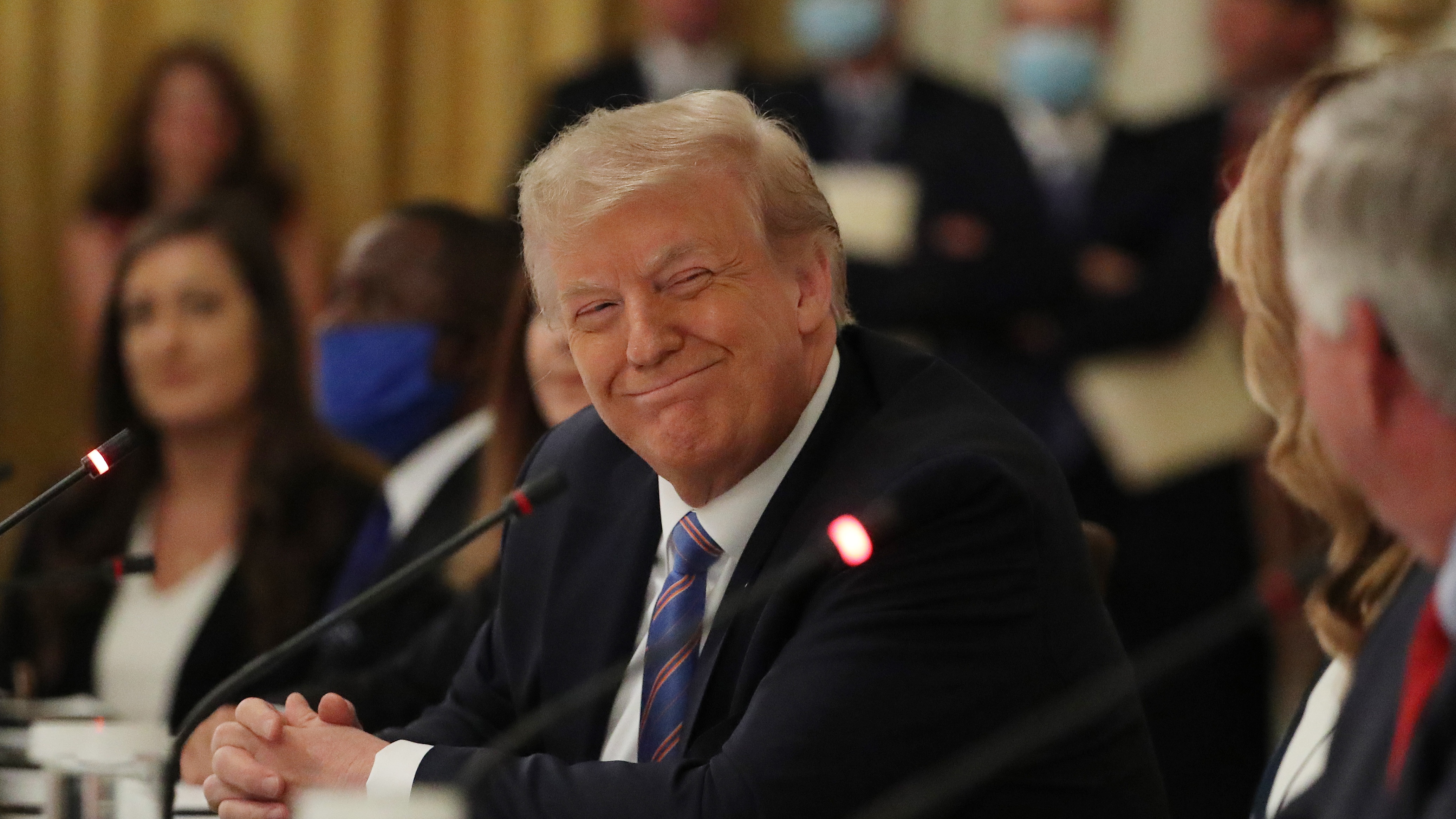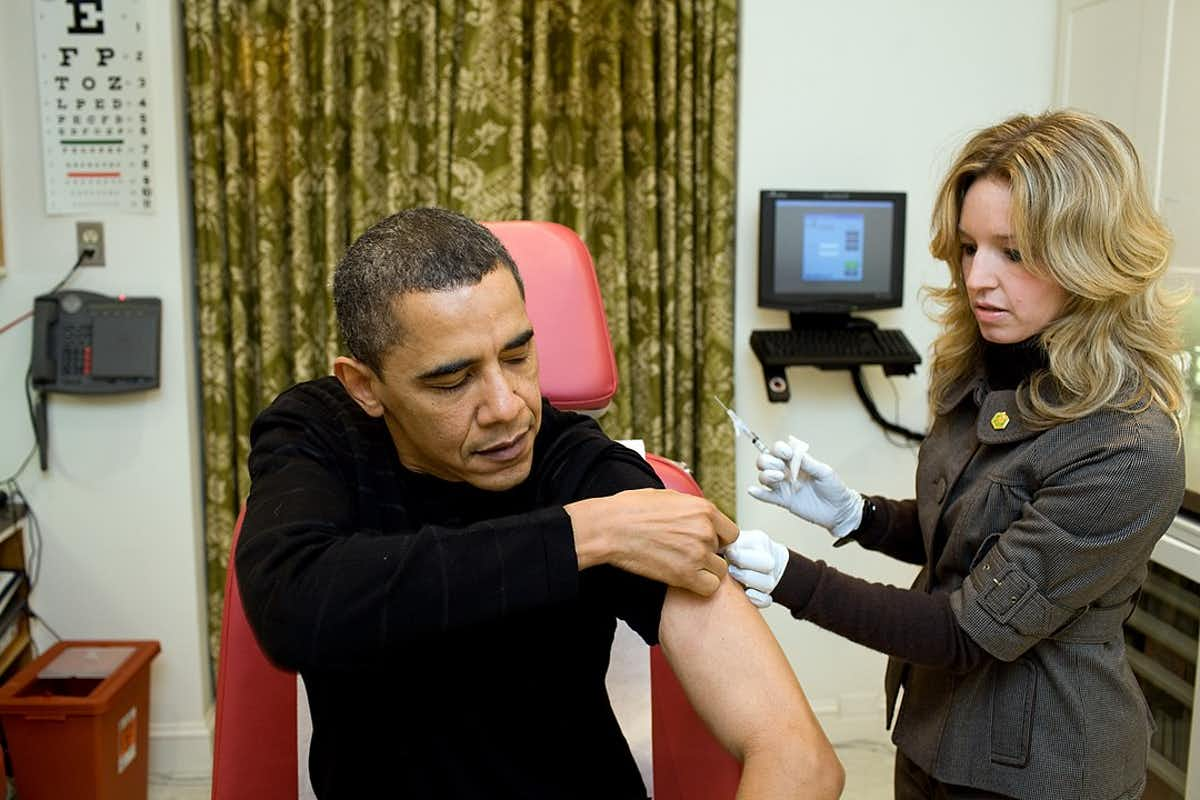Coronavirus: how countries get away with hoarding life-saving drugs
A health law expert explains how the UK and US can keep vital treatments for themselves

A free daily email with the biggest news stories of the day – and the best features from TheWeek.com
You are now subscribed
Your newsletter sign-up was successful
Mark Eccleston-Turner, lecturer in global health law at Keele University, on how the US was able to buy up the global stock of the key coronavirus drug remdesivir.
The news that the US has bought the global supply of remdesivir – a drug that can treat Covid-19 – has rightly been criticised as “treatment nationalism”. But the US is not the only country acting selfishly. The UK recently banned the export of dexamethasone – the only drug proven to reduce deaths in people severely ill with Covid.
Treatment nationalism is not a new phenomenon. During the 2009 swine flu pandemic, wealthy countries dominated the procurement of the swine flu vaccine. Developing countries only got access to the vaccine much later on in the pandemic (when the vaccine would have been less effective) and in much smaller doses.
The Week
Escape your echo chamber. Get the facts behind the news, plus analysis from multiple perspectives.

Sign up for The Week's Free Newsletters
From our morning news briefing to a weekly Good News Newsletter, get the best of The Week delivered directly to your inbox.
From our morning news briefing to a weekly Good News Newsletter, get the best of The Week delivered directly to your inbox.
This is poor public health and it is poor multilateralism. It is morally wrong to think that someone has a stronger claim to a vaccine because they live in a rich country.
Can it be prevented?
There is a range of measures governments could take to dominate the supply of a drug or vaccine during a pandemic. The first is simple market domination. This is the case with remdesivir and the US. Because of intellectual property rights, remdesivir can only be manufactured by Gilead, an American company. And the US has contracted with Gilead to purchase nearly all of its supply. So far, so free market.
However, there are some options to overcome this. Patents can, and should, be circumvented during a pandemic. Tools like compulsory licencing can give permission to generic drug manufacturers to make a patented drug.
A free daily email with the biggest news stories of the day – and the best features from TheWeek.com
Providing generic manufacturers can access the raw ingredients contained within remdesivir they can easily manufacture and licence a generic version of the drug. They can do so for significantly less than the US$2,340 (£1,878) Gilead is charging for each patient.
There are other legal options in the area of “treatment nationalism”, too. The UK has placed dexamethasone on its export ban list, meaning that any drug wholesaler attempting to export this drug to other countries could lose their licence.

Barack Obama being immunised against swine flu in 2009.Pete Souza/Wikimedia Commons
Other options could include government indemnification of drug or vaccine manufacturers for failure to perform contractual obligations, so that even if the manufacturer has contracted to supply drugs or vaccines to other countries, the government will prevent them from being sued for breach of contract if they fail to fulfil the order.
A more extreme measure would be compulsory requisition of drugs or vaccines that are due to be exported to another country. In the UK, the Civil Contingencies Act 2004 makes provision that a “senior Minister of the Crown” may make emergency regulations, including confiscating private property with or without compensation.
While we have not seen this in a pandemic, there is an established history of private assets and land being seized in an emergency, including in the UK. It hasn’t happened yet, but it could.
Vaccines
To return to vaccines, earlier I explained that compulsory licensing allows generic drug manufacturers to make a patented drug, to ensure access. This is not the case with vaccines. The vaccine market is dominated by a handful of manufacturers operating in a few countries. There is no generic competition.
A vaccine is key to the Covid-19 global response strategy. However, it is not yet clear how any Covid-19 vaccine will or ought to be distributed, despite significant issues of fairness, equity and justice. Developing countries may not have access to a Covid-19 vaccine without a governance framework guiding international allocation.
During the 2009 swine flu pandemic, this was certainly the case. However, the WHO relies on donations from wealthy countries with excess vaccine to supply developing countries. These donations came too late, and only once wealthy countries were satisfied they had enough vaccine to meet their own needs.
Given the severity of Covid-19, wealthy countries may be even less likely to donate vaccine to their poor neighbours and could use a range of legal tools to prevent this from happening.
Our new research project aims to assess the viability of international access and benefit-sharing models to determine what lessons can be applied to the distribution of Covid-19 vaccines overcome these legal barriers.
Mark Eccleston-Turner, lecturer on global health law, Keele University
This article is republished from The Conversation under a Creative Commons license. Read the original article.
-
 Why are election experts taking Trump’s midterm threats seriously?
Why are election experts taking Trump’s midterm threats seriously?IN THE SPOTLIGHT As the president muses about polling place deployments and a centralized electoral system aimed at one-party control, lawmakers are taking this administration at its word
-
 ‘Restaurateurs have become millionaires’
‘Restaurateurs have become millionaires’Instant Opinion Opinion, comment and editorials of the day
-
 Earth is rapidly approaching a ‘hothouse’ trajectory of warming
Earth is rapidly approaching a ‘hothouse’ trajectory of warmingThe explainer It may become impossible to fix
-
 Why are election experts taking Trump’s midterm threats seriously?
Why are election experts taking Trump’s midterm threats seriously?IN THE SPOTLIGHT As the president muses about polling place deployments and a centralized electoral system aimed at one-party control, lawmakers are taking this administration at its word
-
 ‘Restaurateurs have become millionaires’
‘Restaurateurs have become millionaires’Instant Opinion Opinion, comment and editorials of the day
-
 NIH director Bhattacharya tapped as acting CDC head
NIH director Bhattacharya tapped as acting CDC headSpeed Read Jay Bhattacharya, a critic of the CDC’s Covid-19 response, will now lead the Centers for Disease Control and Prevention
-
 Should the EU and UK join Trump’s board of peace?
Should the EU and UK join Trump’s board of peace?Today's Big Question After rushing to praise the initiative European leaders are now alarmed
-
 Local elections 2026: where are they and who is expected to win?
Local elections 2026: where are they and who is expected to win?The Explainer Labour is braced for heavy losses and U-turn on postponing some council elections hasn’t helped the party’s prospects
-
 Witkoff and Kushner tackle Ukraine, Iran in Geneva
Witkoff and Kushner tackle Ukraine, Iran in GenevaSpeed Read Steve Witkoff and Jared Kushner held negotiations aimed at securing a nuclear deal with Iran and an end to Russia’s war in Ukraine
-
 Kurt Olsen: Trump’s ‘Stop the Steal’ lawyer playing a major White House role
Kurt Olsen: Trump’s ‘Stop the Steal’ lawyer playing a major White House roleIn the Spotlight Olsen reportedly has access to significant US intelligence
-
 Trump’s EPA kills legal basis for federal climate policy
Trump’s EPA kills legal basis for federal climate policySpeed Read The government’s authority to regulate several planet-warming pollutants has been repealed